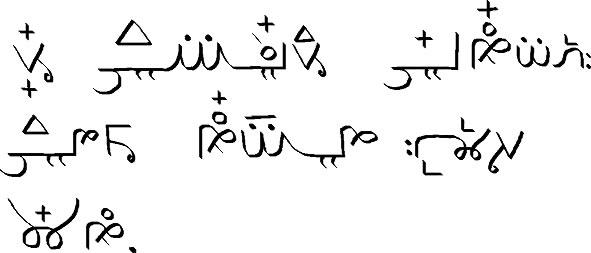Podcast: Play in new window | Download

Here’s the latest news from the world of Omniglot.
New language pages:
- Meyah, a West Papuan language spoken in eastern Indonesia.
- Izon, an Ijaw language spoken in soutern Nigeria.
- Kakwa (Kãkwã), a Puniave-Maku language spoken mainly in southeastern Colombia.
- Bori, an Eastern Tani language spoken in Arunachal Pradesh in northeastern India.
New numbers page:
- Bori, an Eastern Tani language spoken in Arunachal Pradesh in the northeast of India.
- Izon, an Ijaw language spoken in soutern Nigeria.
- Ladino (djudeo-espanyol / ג’ודיאו-איספאנייול), a Jewish language based on Medieval Spanish and spoken mainly in Israel, Turkey and Greece.
New constructed script: Dust Witch Runes, which were invented by Kitsune Sobo as the native script of the Dust Witches in the fictional Rhodinoverse.

New constructed script: Zuravot, which was created by Eliya Gobani to write a constructed language by the same name based on Arabic.

On the Omniglot blog there’s a new post about the word Taradiddle (a trivial lie or fib) and other diddlesome words, and there’s also the usual Language Quiz. See if you can guess what language this is:
Here’s a clue: this language is spoken in northern Germany, but isn’t a variety of German.
The mystery language in last week’s language quiz was Batsbi (ბაცბურ მოტტ), a Northeast Caucasian language spoken in the Akhmeta distict in eastern Georgia.
In this week’s Celtic Pathways podcast, Bits & Pieces, we piece together the Celtic roots of the word piece, and related words.
On the Celtiadur blog there’s a new post entitled Monday Moons, and I made improvements to the post about Parts and Portions.
For more Omniglot News, see:
https://www.omniglot.com/news/
https://twitter.com/Omniglossia
https://www.facebook.com/groups/omniglot/
https://www.facebook.com/Omniglot-100430558332117
You can also listen to this podcast on: Apple Podcasts, Amazon Music, Stitcher, TuneIn, Podchaser, PlayerFM or podtail.
If you would like to support this podcast, you can make a donation via PayPal or Patreon, or contribute to Omniglot in other ways.
Radio Omniglot podcasts are brought to you in association with Blubrry Podcast Hosting, a great place to host your podcasts. Get your first month free with the promo code omniglot.










